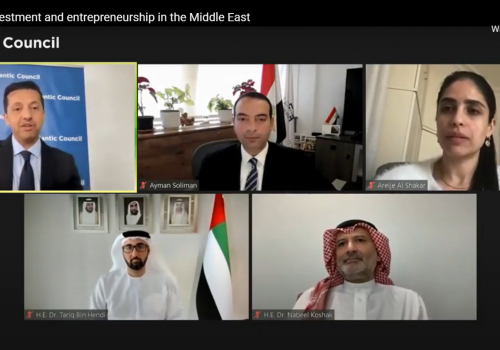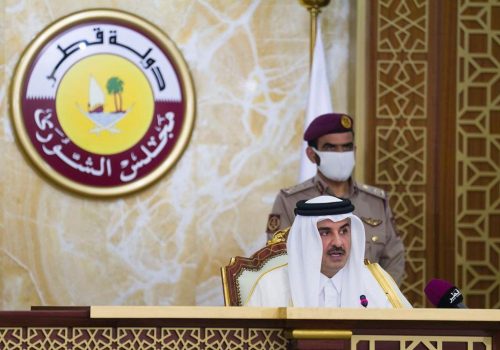Qatar and Egypt are letting bygones be bygones
Since the signing of the Al Ula declaration in January to officially end the Qatari rift with Saudi Arabia, the United Arab Emirates (UAE), Bahrain, and Egypt, Egyptian-Qatari rapprochement has been among the fastest to develop. Within two weeks of the agreement’s signing, the Egyptian Foreign Ministry announced that Cairo and Doha had officially agreed to resume diplomatic ties, making Egypt the first country in the group to do so. By early March, the countries’ foreign ministers had met in Cairo on the margins of an Arab League meeting.
Though renewed relations will bring challenges and fundamental political differences between the two countries will remain, Egypt’s will to move forward is no surprise. The benefits of stronger Egyptian ties with Qatar—particularly economic ties—outweigh the risks. In more subtle ways, increased Egyptian-Qatari dialogue on issues like Libya and the Great Ethiopian Renaissance Dam (GERD) could also prove beneficial to both countries’ political and security interests. Indeed, Egyptian leadership should be leaning forward to rebuild ties with Qatar and, given the possible benefits to regional stability, the Joe Biden administration should carefully encourage those efforts.
Economic calculations
That the first official Qatari delegation to Egypt after the Al Ula summit was led by Qatar’s finance minister to inaugurate a $1.3 billion luxury hotel in Cairo is emblematic of Egypt’s calculations. Foreign investment has been a key pillar of the Egyptian government’s attempts to stabilize and grow the country’s economy amid continued structural issues. With Foreign Direct Investment (FDI) inflows to Egypt declining significantly in 2020 due to the coronavirus pandemic, Egyptian leadership is redoubling efforts to attract investment, and the end of the rift with Qatar provides an important opening. Egypt will continue to rely on Gulf investment—even if that investment is less robust than it once was—and Qatar is among the best-placed Gulf neighbors to meet Egypt’s need.
Qatar’s estimated $5 billion in Egyptian investments did not halt during the rift. After Egyptian officials stated that Qatari investments would be protected early on in the diplomatic crisis, Qatari Diar, for example—which built the St. Regis hotel complex in Cairo—has maintained major Egyptian projects totaling $3 billion. Similarly, Qatar Petroleum moved forward with its major stake in the 2019 launch of the $4.4 billion Egyptian Refining Company. But resolving the Qatar crisis has cleared the way for this spending to potentially increase as Qatar continues to diversify its investments while bolstering ties with its neighbor, drawing on its $300 billion sovereign wealth fund as well as healthy Qatari private investment. We can expect to see continued economic support and investment in real estate, tourism, energy, banking, and perhaps even the defense industry, if Qatar’s Defense Ministry-owned Barzan Holdings potentially considers avenues to broaden its regional cooperation.
Regional security issues
On a host of regional security issues and the role of political Islamist movements—Doha has supported the Muslim Brotherhood while Cairo views it as anathema—Qatar and Egypt will remain fundamentally divided. However, their renewed bilateral engagement may help strengthen some areas of common ground. Two, in particular—Libya and the diplomatic crisis over the GERD—potentially stand to benefit. In line with the Biden administration’s promotion of expanded diplomatic cooperation in the region as an answer to intra-regional tensions, closer Qatari-Egyptian ties could contribute positively to the regional security environment.
With the ceasefire in the decade-long Libyan conflict partially implemented and a Libyan unity government newly sworn in, Egypt’s activities in Libya are shifting from the military realm to diplomacy in ways that Qatar may encourage and benefit from. After years of supporting General Khalifa Haftar’s Libyan National Army, which were mostly defeated by the United Nations-backed Government of National Accord (GNA) forces last year, Egypt is now keen to build ties with the new Libyan unity government. Libya’s interim Prime Minister Abdelhamid Debeibeh has already been hosted in Cairo by President Abdel Fattah al-Sisi, who cited Egypt’s “eagerness to support the Libyan people.”
However, Egyptian leadership has persistent concerns about the integration of militias into a new unified Libyan military. The renewed Egyptian-Qatari communication channel may help to reassure Egypt that forces remaining loyal to Qatar and Turkey, who had supported the GNA, will not present a threat on Egypt’s Western border. This should encourage Egypt to prevent Haftar from being an obstacle on the path to unification. More importantly, Egyptian communication with Qatar in Libya may also help build room for increased Egyptian dialogue with Turkey, with whom it has quietly sought improved relations in recent weeks. Those conversations could have broad, positive ramifications for regional stability.
Qatar is also well positioned to take a more active role in the GERD controversy in ways that could prove beneficial to Egypt and regional stability. In addition to its investment activities in Egypt, Qatar has significant investments in both Ethiopia and Sudan; its Sudanese investments comprise some $3.8 billion and a 2018 agreement to build a port. Qatar has an interest in an amicable resolution to the current crisis. Doha could help to tamp down rising tensions between an Ethiopian government, which is resolutely moving forward with the GERD, and Egyptian and Sudanese leadership, whose rhetoric and opposition is fueling concerns that a conflict could eventually ensue.
On April 7, Abdel Fattah Al Burhan, head of Sudan’s ruling council, made his first trip to Doha to reinstate a long list of previous bilateral agreements. This trip was reportedly done in coordination with Egypt, which has continued to pursue closer ties with Sudan, including military cooperation and a visit by President Sisi to Khartoum in recent weeks. As complex discussions continue over who will mediate the crisis, Qatar could serve an indirect role, shoring up and moderating Egyptian and Sudanese cooperation, while pressing Ethiopia to soften its position as Qatar seeks stability in the region to support its investments.
Ultimately, Qatari and Egyptian cooperation on either of the above will take time and confidence-building that could be weakened by any number of developments, including continued critical rhetoric commonly used by both countries’ state-backed media toward one another. However, progress is possible and even more likely if carefully encouraged by the Biden administration.
Biden administration approach
How to view Qatar-Egypt ties from Washington? A rapprochement between Qatar and its neighbors has been the US objective since the Qatar feud began in 2017, one of the key points of continuity between the Donald Trump administration and the Biden administration vis-à-vis the region. Increased dialogue and cooperation are a net positive for US interests in regional stability and can allow Qatar, Egypt, and its neighbors to focus on areas of common ground and mutual concern to the US, including Iran. To be sure, US officials could see potential challenges in growing Egypt-Qatari ties. For example, the potential for Qatar to support increased Egyptian ties with Turkey brings together two governments that have already shown an appetite to risk US Countering America’s Adversaries Through Sanctions Act (CAATSA) sanctions over the purchase of Russian weapons (though both are ultimately US partners, and their rapprochement would have regional benefits as well).
Ultimately, increased Qatari-Egyptian cooperation will likely do more to align with the Biden administration’s interests in increasing diplomacy in the region at a time when the US is re-evaluating its military footprint, which brings far more positive possibility than risk for Cairo and Doha and for US interests in the region.
Allison Nour is a vice president at The Cohen Group and leads the firm’s Middle East practice.
Image: Amir of Qatar Sheikh Tamim bin Hamad Al-Thani and the President of Egypt Abdul Fattah El-Sisi in Sharm El-Sheikh, Egypt on March 28, 2015. (Diwan.gov.qa)


